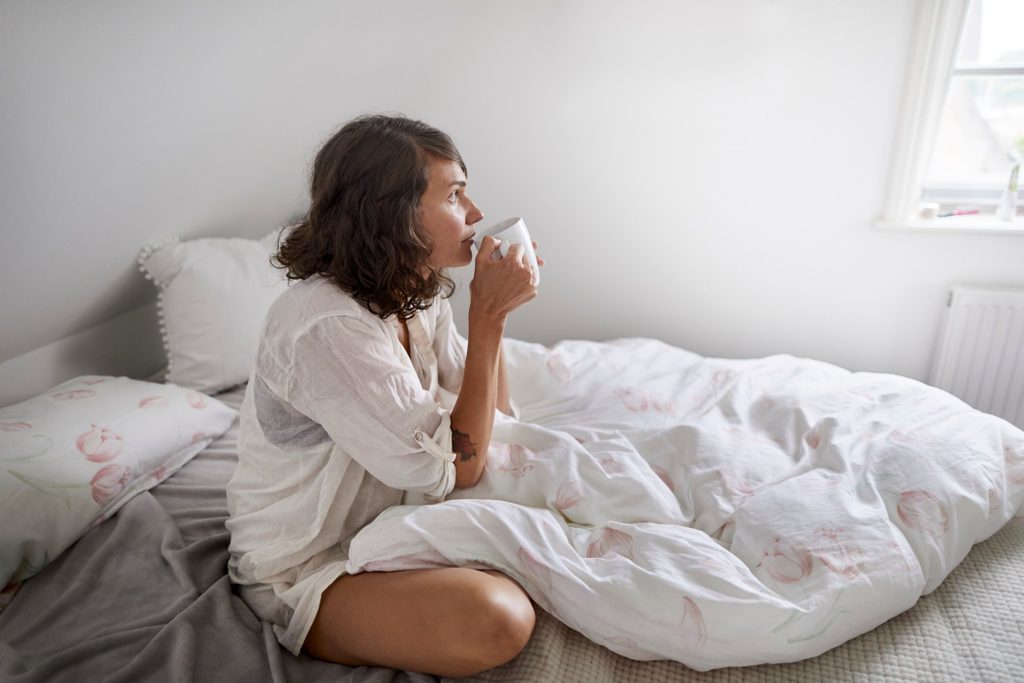Do You Have Morning Anxiety?

When thoughts and worries hit as soon as your eyes pop open, you may have morning anxiety.
In an ideal world, you wake up refreshed and ready to conquer the day. Or at the very least, neutral about what’s ahead. But what if you wake up gripped with worry, racing thoughts, and are mentally playing out the worst-case scenarios of how the day could go very, very badly?
It could be morning anxiety. Morning anxiety is one way a generalized anxiety disorder (GAD) may manifest. But after understanding why it happens (it’s actually pretty normal), there are strategies you can try to prevent and manage those overwhelming feelings of worry and dread.
An anxiety disorder “causes unexpected or unhelpful anxiety that seriously impacts our lives, including how we think, feel, and act,” according to the Canadian Mental Health Association. You may feel nervous, irritable, or on edge or have a sense of impending panic or doom.
Additional symptoms of anxiety include an increased heart rate, rapid breathing or sweating, headaches, and stomachaches. Just the thought about what’s in store for the day makes some people anxious.
(Related: How to Know If Your Anxiety Is “Normal”)
Causes and risk factors
Your body was built to deal with anxiety as soon as you open your eyes in bed, says Alex Dimitriu, MD, a dual-board certified doctor in psychiatry and sleep medicine in Menlo Park, California.
“In the morning, [the stress hormone] cortisol is elevated, and you have more adrenaline and an elevated heart rate. That’s what wakes people up,” he explains. But for some people with anxiety, that physiological response becomes psychological and symptoms are far worse in the morning than any other time of day.
Lack of sleep or going to bed late the night before tends to make morning anxiety worse, says Dr. Dimitriu. The circumstances of the day can also accentuate symptoms. “Lateness can really make people anxious,” he says. It can make you feel scattered as you scramble to make up for lost time all day. (Here are a few sleep hacks to make sure you get your vitamin Zzz.)
Your diet can impact anxiety too. What you eat and drink first thing in the morning can impact how you feel all day. Too much caffeine or not enough water can make you feel anxious. Low blood sugar from not having enough to eat can also trigger symptoms of anxiety. (Here’s how to maintain healthy blood sugar levels.)
Managing morning anxiety
If you have morning anxiety, it can help to tackle the anxious thoughts as quickly as possible, says Virginia Runko, PhD, a behavioral sleep medicine specialist and psychologist in Washington, D.C.
She recommends a few minutes of meditation as soon as you wake up. If you have anxiety, this may seem like an impossible ask, as sitting with your thoughts can be uncomfortable. (Watch out for these meditation mistakes that secretly stress you out.)
However, a study in The FASEB Journal in 2018 suggests that a single, extended session of mindfulness meditation may reduce anxiety and can improve cardiovascular function in adults who have mild to moderate anxiety.
In addition, medication is also a potential option that can help relieve morning anxiety, says Runko. Tricyclic antidepressants and serotonin reuptake inhibitors (SSRIs) are common drugs used to treat anxiety. Talk to your doctor to decide on the right treatment for you.
(Related: Treatment for Anxiety Disorders Isn’t Just About Medication—It’s About Tackling the Root Cause)
Prevent morning anxiety
These strategies won’t cure anxiety, but they can remove some triggers to give you a more stress-free day:
1. Go to bed on time. How much sleep do you need? Losing even small amounts of sleep is associated with increasing anxiety, according to research in Nature Human Behavior in 2019. On the other hand non-rapid eye movement (NREM) sleep—which accounts for as much as 80 percent of your Zzz’s at night—exerts anti-anxiety effects on the brain, researchers say.
2. Wake up earlier. Because lateness can be such a trigger for anxiety, says Dr. Dimitriu, waking up earlier will help you begin your workday or head out the door on time. Additionally, an earlier start will also help you slow down your morning, which promotes a calm mindset. This may require you to shift your bedtime back in order to get sufficient sleep.
3. Don’t check your phone immediately. In an ideal world, “your day shouldn’t begin with the phone,” says Dr. Dimitriu. Reading about stressful news events before your day even begins compounds anxiety. “Be mindful of what media you ingest, especially in the morning. I recommend trying to keep your mind blank and your thoughts your own for the first hour of the day,” he says.
4. Make dietary changes. Limit alcohol and caffeine. Eat a healthy well-rounded, healthy diet. Don’t skip meals so that your blood sugar doesn’t drop. Drink plenty of water so you stay hydrated.
5. Manage stress. Learn some self-help tips to keep your day from getting out of control. Exercise regularly, learn deep breathing, and practise mindfulness, so you live in the moment instead of worrying about things out of your control.
(Related: Could Laughter Be the Best Medicine for Stress and Anxiety?)
When to seek help
Look for help when morning anxiety becomes distressful. “There’s a stigma about mental health that you need a reason to go,” says Runko. “Why suffer if there’s help out there?”
In this case, in-person therapy (if it’s safe in your area in the current pandemic) or virtual therapy are options. Also consider group therapy or a support group in your area, which will connect you with people who are going through the same things, she recommends. Not only is it helpful to know you’re not alone, but you can share strategies that help you start the day in a more peaceful way.




